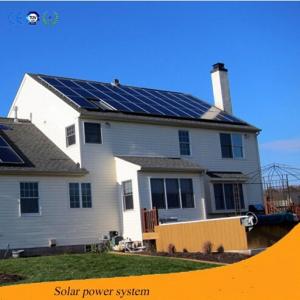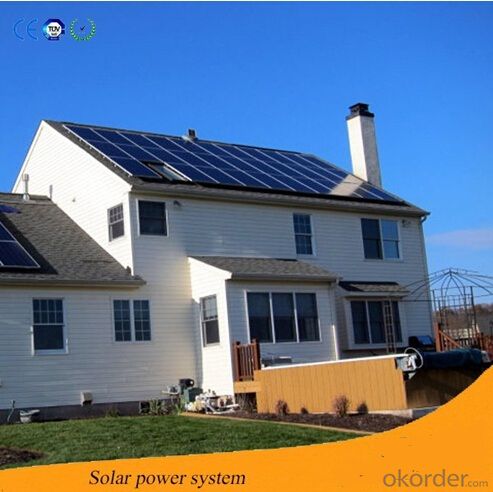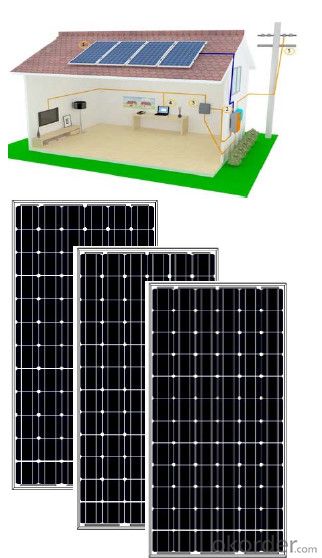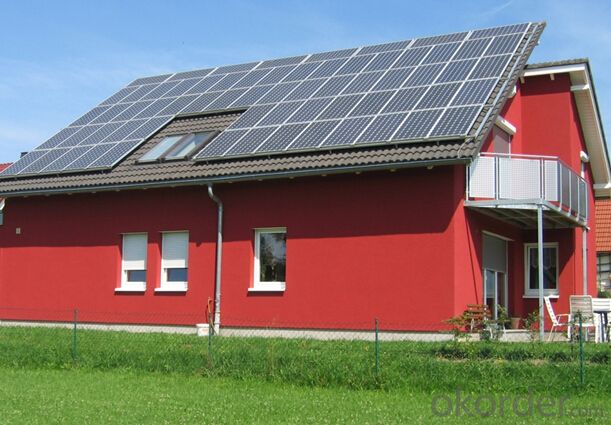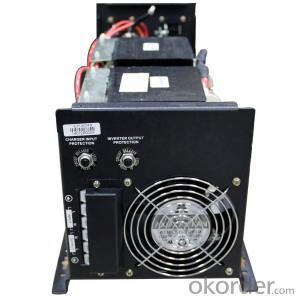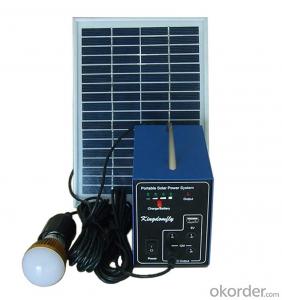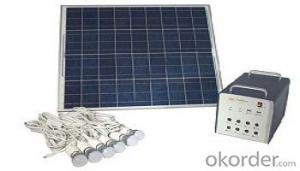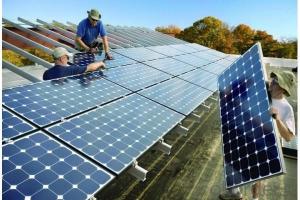Springers Solar Energy Systems Zhenfa-AC1.68KW Solar Home System
- Loading Port:
- China Main Port
- Payment Terms:
- TT OR LC
- Min Order Qty:
- -
- Supply Capability:
- -
OKorder Service Pledge
Quality Product, Order Online Tracking, Timely Delivery
OKorder Financial Service
Credit Rating, Credit Services, Credit Purchasing
You Might Also Like
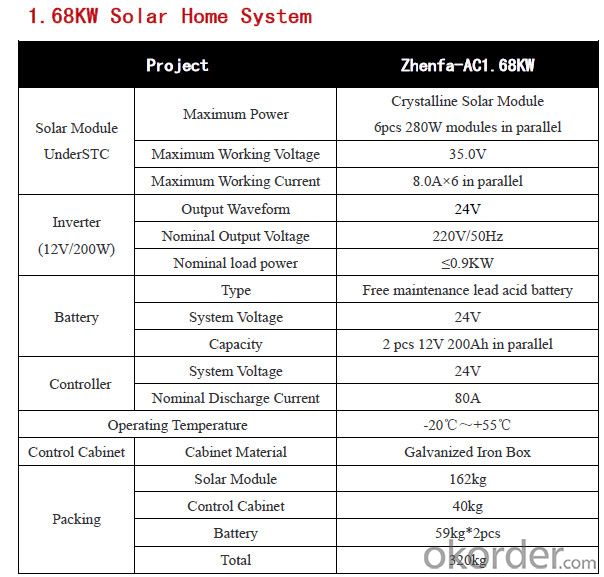
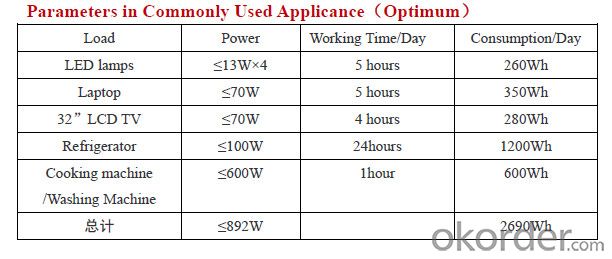

In certain emerging markets, Zhenfa new energy offers home owners complete residential solar system solutions to meet their green energy needs. Zhenfa's residential solar power systems are designed to meet different building applications in system sizes of 1.68kW and 3.9kW. Zhenfa also provides customized solar system solutions for special solar power systemapplications.
- Q: Can solar energy systems be used for desalination or water purification?
- Certainly, desalination or water purification can be accomplished using solar energy systems. Solar energy has the capability to fuel diverse technologies that are utilized in the process of desalination and water purification, thereby establishing itself as a viable and renewable energy source for these purposes. Among the most prevalent techniques for desalination is the utilization of solar stills. Solar stills are apparatuses that employ solar energy to evaporate water, leaving behind salts, impurities, and contaminants. The resulting steam is subsequently condensed and collected, resulting in fresh water devoid of salinity and impurities. Solar stills are particularly effective in regions with abundant sunlight and limited access to freshwater sources. Another method is solar-powered reverse osmosis. Reverse osmosis entails the use of a membrane under high pressure to eliminate salts, impurities, and contaminants from water. By employing solar energy to power the high-pressure pump, this method can efficiently produce fresh water from seawater or brackish water sources. Furthermore, solar energy can be combined with other water treatment technologies such as ultraviolet (UV) disinfection and advanced filtration systems. UV disinfection employs the energy from ultraviolet light to eradicate bacteria, viruses, and other microorganisms present in water. Solar-powered UV disinfection systems are not only environmentally friendly but also cost-effective in areas with limited access to electricity. In conclusion, solar energy systems can be utilized to power a range of desalination and water purification technologies, offering a sustainable and renewable solution to combat water scarcity and enhance access to clean water.
- Q: I want to put on the roof of the solar system from the building, 100 square meters, daily consumption of 6 to 8 degrees. Some users know how much to install KM? About the cost?
- 2013 PV industry in Europe and the United States antitrust investigation, overcapacity led to the collapse of a large number of photovoltaic industry in Zhejiang, solar prices have fallen. This can be checked at any time online
- Q: Can solar energy systems be used in areas with limited access to solar connectors and cables?
- Yes, solar energy systems can be used in areas with limited access to solar connectors and cables. Off-grid solar systems, such as standalone solar panels combined with battery storage, can be deployed in remote or inaccessible areas without the need for extensive infrastructure. These systems are self-sufficient and can generate and store electricity for use even without a direct connection to the grid. They are an excellent solution for providing renewable energy in areas where traditional electrical infrastructure is limited or non-existent.
- Q: Can solar energy systems be used in powering traffic signals?
- Yes, solar energy systems can indeed be used to power traffic signals. Solar panels, also known as photovoltaic (PV) modules, can convert sunlight into electricity, which can then be used to power various devices, including traffic signals. This has several advantages over traditional grid-powered traffic signals. Firstly, solar-powered traffic signals are more environmentally friendly as they do not rely on fossil fuels or emit greenhouse gases during operation. This helps in reducing carbon footprint and combating climate change. Secondly, solar-powered traffic signals are independent of the electrical grid, making them more reliable during power outages or grid failures. They can continue to function even when there is a disruption in the main power supply, ensuring the smooth flow of traffic and maintaining safety on the roads. Furthermore, solar-powered traffic signals require minimal maintenance compared to their grid-powered counterparts. Once installed, solar panels have a long lifespan and only require occasional cleaning to ensure optimal performance. This reduces the need for frequent repairs and upkeep, resulting in cost savings for the traffic management authorities. Lastly, solar-powered traffic signals can be installed in remote or off-grid locations where it would be challenging or costly to extend the electrical grid. This makes them a viable solution for rural areas or areas with limited infrastructure. In conclusion, solar energy systems are an effective and sustainable solution for powering traffic signals. They offer numerous benefits such as environmental friendliness, reliability, low maintenance, and suitability for remote locations. With the advancement of solar technology, the use of solar-powered traffic signals is expected to increase, contributing to a greener and more efficient transportation system.
- Q: Can a solar energy system be installed on a commercial building?
- Yes, a solar energy system can be installed on a commercial building. In fact, many businesses have embraced solar power as a sustainable and cost-effective solution for their energy needs. Installing a solar energy system on a commercial building offers multiple benefits, including reduced electricity bills, potential tax incentives and rebates, increased property value, and a positive brand image associated with environmental responsibility. Commercial buildings typically have ample rooftop space, making them ideal for solar panel installation. Additionally, advancements in solar technology have made it easier and more efficient to integrate solar systems into commercial buildings. With proper planning and professional installation, a solar energy system can provide clean and renewable energy to power various operations within a commercial building, contributing to a greener and more sustainable future.
- Q: Can solar energy systems be used in all locations?
- Solar energy systems can be used in most locations, but their efficiency and effectiveness can vary depending on the local climate and geographic conditions. In general, solar panels require sunlight to generate electricity, so they work best in areas with abundant sunshine and minimal shading. However, advancements in solar technology have significantly improved their efficiency, enabling solar energy systems to be utilized in a wider range of locations. In regions with high levels of solar radiation, such as deserts or tropical areas, solar panels can generate a substantial amount of energy throughout the year. These areas are ideal for solar energy systems as they receive more sunlight, resulting in higher energy production and a shorter payback period for the initial investment. On the other hand, locations with frequent cloud cover or long periods of darkness, such as certain northern regions or areas with dense tree canopies, may experience reduced solar energy production. However, this does not mean that solar energy systems cannot be used in these locations. In fact, solar panels can still generate electricity during cloudy days, albeit at a lower efficiency. Additionally, innovative technologies like concentrated solar power (CSP) or solar tracking systems can improve energy production in areas with less sunshine. Moreover, solar energy systems can be adapted to different geographical conditions. For instance, in areas where space is limited, rooftop solar panels can be installed on buildings. In locations with large open spaces, ground-mounted solar panels or solar farms can be deployed. Furthermore, floating solar panels can be installed on bodies of water, making use of previously unused spaces like reservoirs or lakes. It is important to note that while solar energy systems can be used in most locations, their suitability and economic viability should be assessed on a case-by-case basis. Factors such as local solar resources, electricity demand, installation costs, and government incentives or policies should be considered to determine the feasibility of implementing solar energy systems in a specific location.
- Q: Can solar energy systems be used for powering off-grid weather monitoring stations?
- Yes, solar energy systems can be used for powering off-grid weather monitoring stations. Solar panels can generate electricity from sunlight, which can be stored in batteries for use during cloudy or nighttime conditions. This makes solar energy an ideal and sustainable power source for remote off-grid locations like weather monitoring stations.
- Q: Can solar energy systems be used in areas prone to hurricanes or tornadoes?
- Yes, solar energy systems can be used in areas prone to hurricanes or tornadoes. While extreme weather events like hurricanes and tornadoes can potentially damage solar panels, advancements in technology and installation practices have made solar systems more resilient and able to withstand such conditions. For instance, solar panels are designed and tested to withstand high wind speeds and impact from debris. Additionally, proper installation techniques, such as using reinforced mounting systems and ensuring secure attachment to roofs or the ground, can further enhance their resistance. Therefore, while precautions need to be taken, solar energy systems can still be a viable and sustainable option in areas prone to hurricanes or tornadoes.
- Q: What is the role of monitoring systems in a solar energy system?
- The role of monitoring systems in a solar energy system is to gather and analyze data related to the performance and efficiency of the system. These systems play a crucial role in ensuring that the solar energy system is functioning optimally, and any potential issues or inefficiencies are identified and addressed promptly. Monitoring systems typically include sensors and meters that measure various parameters such as solar radiation, energy production, temperature, and voltage. This data is collected in real-time and can be accessed remotely, allowing system owners, operators, and maintenance personnel to monitor the system's performance from anywhere. By collecting and analyzing this data, monitoring systems provide valuable insights into the overall health and functionality of the solar energy system. They can detect and alert users about any malfunctions, such as faulty panels, inverters, or wiring, enabling prompt maintenance or repairs. This proactive approach helps minimize downtime and maximize energy production, ensuring the system operates at its full potential. Furthermore, monitoring systems also help in optimizing the energy output of the solar system. By tracking energy production and consumption patterns, they can identify opportunities for improvement, such as adjusting the tilt or orientation of the panels, optimizing the battery storage, or even implementing energy-saving measures. These insights allow system owners to make informed decisions to enhance the overall efficiency and performance of the solar energy system. In addition to system performance tracking, monitoring systems also provide valuable financial and environmental benefits. They can calculate and display real-time energy production, enabling system owners to monitor their energy savings and financial returns. This information is crucial for assessing the system's payback period and determining the return on investment. Moreover, monitoring systems enable the identification of any inconsistencies or deviations from expected energy production, which can indicate potential issues such as shading or dirt accumulation on the panels. By addressing these issues promptly, system owners can maintain the system's efficiency, prolong its lifespan, and reduce maintenance costs. Overall, monitoring systems are an integral part of solar energy systems, providing real-time data and insights that help optimize performance, detect and address issues promptly, maximize energy production, and ensure a strong return on investment.
- Q: How much space do I need for a solar energy system?
- The space required for a solar energy system depends on various factors such as the size of the system, the amount of energy needed, and the efficiency of the solar panels. In general, for a residential solar energy system, you would need a roof space of about 100-400 square feet per kilowatt (kW) of solar panels. However, there are alternative options like ground-mounted systems or solar canopies that can be used if roof space is limited. It is recommended to consult with a solar energy professional who can assess your specific energy needs and available space to determine the appropriate size and configuration of the system.
Send your message to us
Springers Solar Energy Systems Zhenfa-AC1.68KW Solar Home System
- Loading Port:
- China Main Port
- Payment Terms:
- TT OR LC
- Min Order Qty:
- -
- Supply Capability:
- -
OKorder Service Pledge
Quality Product, Order Online Tracking, Timely Delivery
OKorder Financial Service
Credit Rating, Credit Services, Credit Purchasing
Similar products
Hot products
Hot Searches
Related keywords
